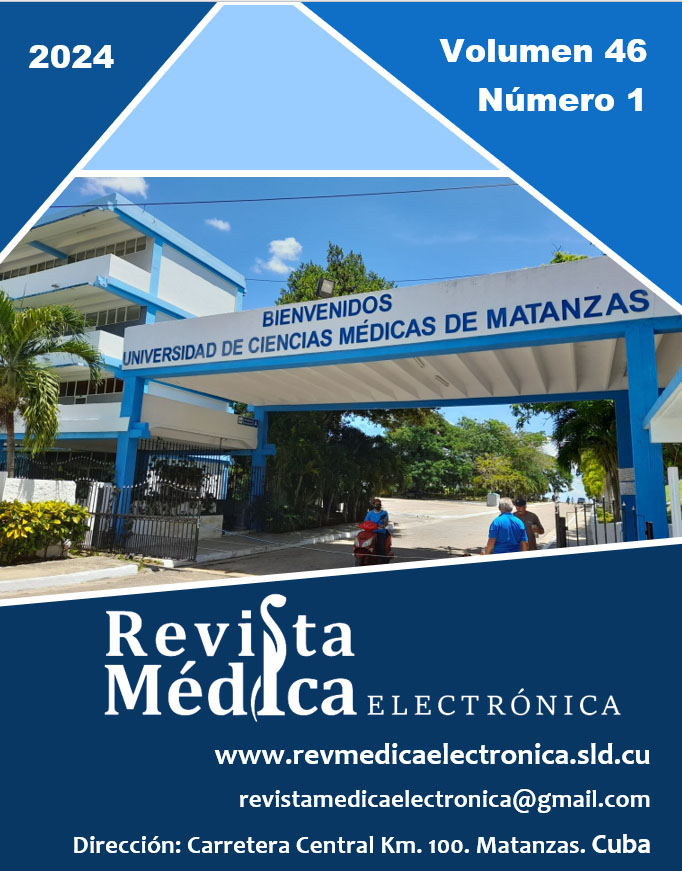Predictive variables of functional gain in patients with deconditioning syndrome associated with hospitalization
Keywords:
desacondicionamiento, deterioro funcional adquirido en el hospital, síndrome post-hospitalizaciónAbstract
Introduction: Acute and prolonged inactivity due to hospitalization affects people's functional capacity.
Objective: To identify the predictive variables of functional gain and efficiency in patients with deconditioning syndrome associated with hospitalization.
Methods: Prospective, single-cohort observational study in patients admitted for deconditioning syndrome associated with hospitalization in the Functional Recovery Unit of the Guadarrama Hospital, from January 2021 to January 2022. The sample consisted of 94 patients selected through simple random sampling. The variables evaluated were age, gender, cognitive impairment, social situation, comorbidities, functional status, walking ability, complications, functional gain, length of stay and efficiency. The level of significance was established in p<0.05.
Results: The average age was 67.78 years, with a higher percentage of men. A functional gain of 37.50 points and an efficiency of 1.25 were obtained. 92.55% of the patients returned home. The predictive variables of functional gain were the Barthel index at admission (p=0.00) and the Charlson index (p=0.002); for efficiency none of the variables studied showed correlation.
Conclusions: Functional and clinical factors influenced the functional recovery of patients with deconditioning syndrome associated with hospitalization. The predictive variables of functional gain were functional status at admission and comorbidities.
Downloads
References
2. Hartley PJ, Keevil VL, Alushi L, et al. Earlier Physical Therapy Input Is Associated With a Reduced Length of Hospital Stay and Reduced Care Needs on Discharge in Frail Older Inpatients: An Observational Study. J Geriatr Phys Ther. 2019;42(2):E7-14. DOI: 10.1519/JPT.0000000000000134.
3. Smith TO, Sreekanta A, Walkeden S, et al. Interventions for reducing hospital-associated deconditioning: A systematic review and meta-analysis. Arch Gerontol Geriatr. 2020;90:104176. DOI: 10.1016/j.archger.2020.104176.
4. Gordon S, Grimmer KA, Barras S. Assessment for incipient hospital-acquired deconditioning in acute hospital settings: A systematic literature review. J Rehabil Med. 2019;51(6):397-404. DOI: 10.2340/16501977-2546.
5. Guilcher SJT, Everall AC, Cadel L, et al. A qualitative study exploring the lived experiences of deconditioning in hospital in Ontario, Canada. BMC Geriatr. 2021;21(1). DOI: 10.1186/s12877-021-02111-2.
6. Chen Y, Almirall-Sánchez A, Mockler D, et al. Hospital-associated deconditioning: Not only physical, but also cognitive. Int J Geriatr Psychiatry. 2022;37(3). DOI: 10.1002/gps.5687.
7. Baztán JJ, González M, Morales C, et al. Variables asociadas a la recuperación funcional y la institucionalización al alta en ancianos ingresados en una unidad geriátrica de media estancia. Rev Clin Esp. 2004;204(11):574-82. DOI: 10.1157/13067367.
8. Labrada-Rodríguez YH, Cuenca-Zaldívar JN, Gragera-Peña P. Recuperación funcional en pacientes mayores de 85 años ingresados en una unidad de media estancia de Madrid. Rev Electrón Dr. Zoilo E Mar Vidaurreta [Internet]. 2023 [citado 10/11/2023];48:e3308. Disponible en: https://revzoilomarinello.sld.cu/index.php/zmv/article/view/3308
9. Fiorentini FJ, Gutierrez P, Bagdonavicius J, et al. Beneficios de una Unidad de Mediana Estancia en la rehabilitación de adultos mayores dependientes. Rev Hosp Ital B. Aires [Internet]. 2020 [citado 20/11/2023];40(1):11-6. Disponible en: https://instituto.hospitalitaliano.org.ar/multimedia/archivos/noticias_attachs/47/documentos/110650_171-176-HI4-19-19-Fiorentini-D.pdf
10. Castellano Vela E, Gómez Pajares F, Rochina Puchades A, et al. Factores asociados a mejoría funcional y nueva institucionalización en enfermos con intervención rehabilitadora en una unidad de media-larga estancia. Rev Clin Esp. 2010;210(1):1-10. DOI: 10.1016/j.rce.2009.06.004.
11. Patrick L, Knoefel F, Gaskowski P, et al. Medical comorbidity and rehabilitation efficiency in geriatric inpatients. J Am Geriatr Soc. 2001;49(11):1471-7. DOI: 10.1046/j.1532-5415.2001.4911239.x.
12. Baztán JJ, Domenech JR, González M, et al. Ganancia funcional y estancia hospitalaria en la unidad geriatrica de media estancia del Hospital Central de Cruz Roja de Madrid. Rev Esp Salud Publica. 2004;78(3):355-66. DOI: 10.1590/s1135-57272004000300005.
13. Koh GC, Chen CH, Petrella R, et al. Rehabilitation impact indices and their independent predictors: a systematic review. BMJ Open. 2013;3(9):e003483. DOI: 10.1136/bmjopen-2013-003483.
14. Tamamura Y, Hachiuma C, Matsuura M, et al. Relationship between Improvement in Physical Activity and Three Nutritional Assessment Indicators in Patients Admitted to a Convalescent Rehabilitation Ward. Nutrients. 2024;16(15):2531. DOI: 10.3390/nu16152531.
15. Wojzischke J, van Wijngaarden J, van den Berg C, et al. Nutritional status and functionality in geriatric rehabilitation patients: a systematic review and meta-analysis. Eur Geriatr Med. 2020;11(2):195-207. DOI: 10.1007/s41999-020-00294-2.
Downloads
Published
How to Cite
Issue
Section
License
All content published in this journal is Open Access, distributed under the terms of the CC BY-NC 4.0 License.
It allows:
- Copy and redistribute published material in any medium or format.
- Adapt the content.
This will be done under the following terms:
- Attribute the authors' credits and indicate whether changes were made, in which case it must be in a reasonable way.
- Non-commercial use.
- Recognize the journal where it is published.
The copyrights of each article are maintained, without restrictions.






